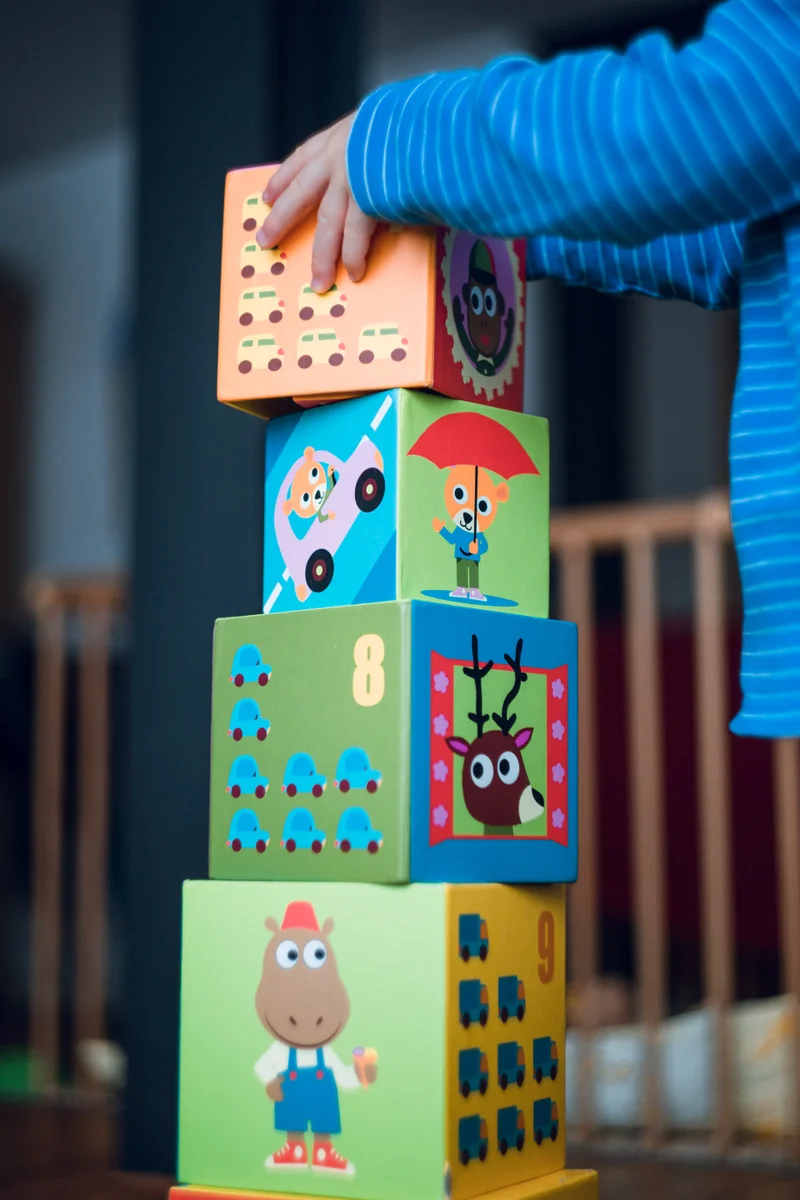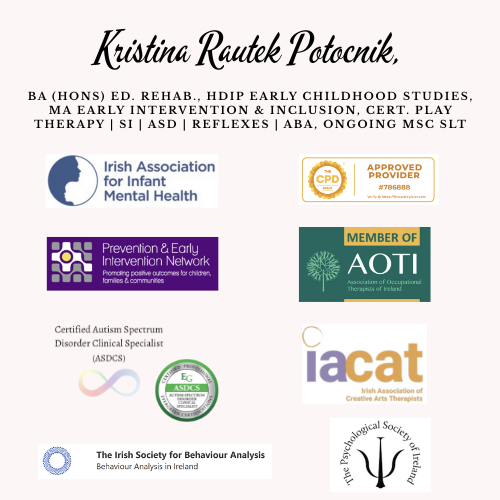Early Intervention through Play: How Everyday Activities Support Your Child’s Development

Author: Kristina Rautek Potocnik, BA (Hons) Ed. Rehab., HDip Early Childhood Studies, MA Early Intervention & Inclusion, Cert. Play Therapy | SI | ASD | Reflexes | ABA, ongoing MSc SLT
Early Intervention through Play: How Everyday Activities Support Your Child’s Development
Early intervention helps young children who have difficulties with daily skills like moving, playing, or communicating. The goal is to support your child so they can take part in daily activities—like eating, dressing, playing, and learning—with more independence and joy.
Each child is different, so early intervention focuses on the individual needs of your child. The therapist watches how your child moves, plays, and responds to the world around them, and chooses fun activities to help build skills step by step. These activities support your child’s motor, sensory, thinking, emotional, and social development.
What skills are supported through early intervention?
Your child’s early intervention program may include:
– Gross and fine motor skills (e.g., crawling, walking, hand use, grasping)
– Sensory processing (e.g., touch, sound, movement, balance)
– Thinking and learning (e.g., attention, memory, problem-solving)
– Social and emotional skills (e.g., playing with others, managing feelings)
– Daily life activities (e.g., feeding, dressing, toileting)
Play is the most important activity in early childhood. It’s how children explore the world, build relationships, and develop their personality. For children with physical or cognitive challenges, play may need to be adapted—but it is just as important.
Children with limited movement or strength, such as those with cerebral palsy, may need specially chosen toys or ways to play that match their abilities. The activities should be safe, engaging, and support both fun and development.
What can parents use at home to support development?
Here are some activity ideas that are easy to try at home:
– Use rattles, sound blocks, squishy toys, or soft balls to build grasp, hand control, and finger strength.
– Try colourful rings or stacking toys to practice hand coordination and moving both arms together.
– Offer toys in different shapes, sizes, and textures to help your child learn about weight, colour, and form.
– Play with dolls to encourage role play and social connection.
– Use play dough or soft clay to support creativity, focus, and hand muscle strength.
– Blow bubbles—let your child watch and reach for them to build eye-hand coordination.
– Use toys with lights or sound to encourage visual tracking.
– Show animal pictures and make matching sounds to help your child focus, look, and imitate.
Music and movement are great motivators—use them to make play more exciting. Keep sessions short and fun. If your child avoids certain tasks, make them into a game and let them choose when to start.
Why is early support important?
Early support helps your child grow with confidence. Children who get help at a young age are more likely to build the skills they need for preschool, home life, and making friends. You are your child’s best partner—your support at home makes a big difference.
If you have questions about your child’s development, don’t wait. A specialist in early intervention can help you understand your child’s needs and give you simple, practical ways to support them through play.
Latest Posts
- How children make sense of the world through their senses
- How your baby learns about the world through their senses
- Helping your child grow stronger through movement and play
- Understanding How Early Intervention Helps Children Learn, Move, and Connect
- How to Recognise Tactile Defensiveness and Help Your Child Feel Safe
- Understanding Feeding Challenges and How to Support Your Child at Home
- Let’s Talk Sitting: Exploring Floor Seating Options
- Retained Primitive Reflexes: The Hidden Cause Behind Developmental Struggles
- Where Curiosity Blossoms: How Children's Play Nurtures Growth for All
- Helping Your Child Through Stress: A Gentle Guide for Parents
- Sweet Little Lies – How to Recognise and Respond with Care
- Chores Are More Than Just Tasks – They’re a Tool for Growing Independence, Focus, and Confidence
- How to Help Children Develop Emotional Intelligence
- Blending Technology and Care: How VR Meta Quest Supports Children at NeuroNest
- A simple guide for parents who want to raise confident, happy children
- Setting Boundaries with Love: A Simple 3-Step Guide for Parents
- Understanding Behavior Through the Nervous System
- A Compassionate Lens on Dysregulation in Non-Speaking Autistic Individuals
- Supporting Development Through Movement: The Role of the Swing in Early Intervention
- Blending Tradition and Innovation: How NeuroNest Supports Your Child’s Unique Journey
- When Movement Meets Innovation: Supporting Child Development with GoBalance
- Why Visual Perception Matters for Everyday Life and Development
- Benefits of Chess in Early Intervention
- Building Healthy Nutrition from the Start
- A Journey Back to Your True Self
- Supporting Your Child’s Hand Skills for Confident Writing
- Blending the Best of Both Worlds
- Helping Toddlers Eat Well: A Parent’s Guide
- Why Tummy Time Matters for Your Baby's Development
- Helping Your Child Build Everyday Independence
- Who Are the Disconnected Kids?
- From First Tries to Automatic Habits: Understanding the Stages of Skill Learning
- Why a Child’s Level of Alertness Matters for Memory and Learning
- Early brain development starts before birth
- Why Slowing Down, Adapting Tasks, and Adding Breaks Helps Children Learn Better
- Why ADHD, Autism, Dyslexia and Other Challenges Need a New Approach
- The surprising power of copying in child development
- Books are more than just language tools—they’re powerful allies in sensory and motor development.
- Rethinking sensory support: moving beyond expensive rooms toward everyday understanding.
- Understanding how fear develops in a child’s brain
- Understanding how an early baby reflex can affect your child’s daily life
- A gentle start into baby development through movement and bonding
Our Partners



Our Memberships


